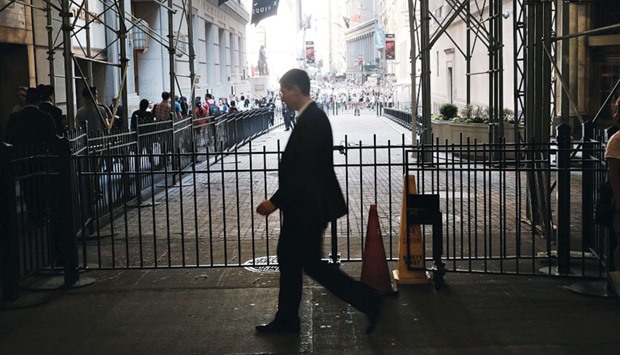
A trader walking out of the New York Stock Exchange (NYSE) on Wall Street following news that the United Kingdom has voted to leave the European Union on Friday. The Dow Jones industrial average closed down over 600 points on the news with markets around the globe plunging.
Britain’s stunning rejection of the European Union marks globalisation’s biggest reversal since the end of World War Two. Thursday’s vote to leave the EU, an unprecedented step, may in turn trigger more dissolution, both of Britain and the EU.
The range of economic and financial markets consequences are vast, but can broadly be summarised: people, goods and capital will all face increasing barriers to movement in coming years, and not just in Britain.
This isn’t inevitable, nor will it be evenly distributed across time and space, but it is going to bring with it substantial costs.
“The UK has taken a significant step back from globalisation. That’s a trend gaining political support across the West. Such a significant secular shift has the potential to have substantial implications for growth, corporate profits and asset prices in the medium term,” Ric Deverell and Neville Hill of Credit Suisse in London wrote in a note to clients. “We think the repricing in many markets has further to run.”
That’s an admirable understatement.
One market far away from Britain and perhaps the most important in the world already repriced, drastically, in the hours after the result became known. Futures prices that track expectations of future Federal Reserve policy moves are showing a higher likelihood of a cut in US interest rates before a rise.
Whereas on Wednesday the chances of a rate increase by November’s US presidential election were put at more than 1-in-3, markets now see no chance of a hike by then and a 1-in-8 possibility of a cut.
That’s because Britain’s decision to leave the EU not only adds to the conditions contributing to a secular slowdown in global growth, it increases the chances of further shocks.
“There is a pan-Developed Market aspect to this anti-establishment vote - which is likely to raise market concern that Donald Trump could become president of the US in November 2016, or Marine Le Pen may do well in the French presidential election in 2017, or the hard left may do well in Spain’s forthcoming parliamentary elections, etc,” economist Charlie Robertson of Renaissance Capital wrote to clients.
“We still imagine that political trends support a shift against the richest in society (London voted to Remain), and in favour of Keynesian spending.”
Indeed, one of the most unsettling aspects of the upset vote was the huge gulf between the electorate and the read taken of events by the elites who do most of the world’s investment, analysis and journalism.
The read-across from this to the US presidential election, featuring Trump, is a grim one.
If you think global capital and trade flows are under threat now, wait until there is someone in the White House whose policies would result in a global trade war and who has elastic views about the meaning of honouring sovereign debts.
But really, even if Donald Trump does not win, globalisation is already, by some measures, in a retreat that is likely to last.
Three of the main legs of globalisation: immigration, trade and capital mobility are all under varying degrees of duress.
Global exports of goods and services declined 12.9% in dollar terms last year, according to IMF data, with goods alone falling by 12.5%. Growth in world trade, which has a long post-war history of outpacing global economic growth, failed to stage a lasting recovery after the financial crisis and was at about 1%, on WTO measures, at the end of last year.
While some of this is accounted for by dollar strength and commodity price weakness, much too can be attributed to rising barriers to trade.
Trade-distorting measures, such as tariffs and subsidies, were up 40% in the first 10 months of 2015 in Group of 20 industrial nations, according to the Center for Economic Policy Research.
Global interbank lending, a key measure of financial flows, is also in retreat, falling by more than half a trillion dollars in the last quarter of 2015, according to BIS data.
Much of this is due to squabbling over what diminishing global growth there is, but neither the dearth nor the squabbling is likely to end soon.
At the same time, there are real reasons for corporations and individuals to take a more cautious approach to investing, giving growing political risks.
Many will tend, even in the absence of financial repression, to concentrate more of their investments at home. Look for the global repricing in anticipation of all of this to continue.
- James Saft may be contacted on e-mail at [email protected]
